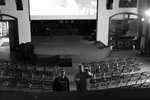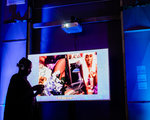





For a full schedule of film screenings and live music events at Capital City Film Fest, visit capitalcityfilmfest.org
Over at The Fledge, a screening of the independent horror film “Good Madam” will soon be projected in front of an enthusiastic crowd of local cinephiles. A few blocks away, the All of the Above Creative group will prepare to pump up the jams at The Avenue Café with a hip-hop takeover.
Two dissimilar mediums, but both upcoming events will be part of the Capital City Film Festival — Lansing’s answer to dynamic events like South by Southwest and the Sundance Film Festival.
“We wanted to bring something closer to the Midwest — blue-and white-collar roots together,” said Jason Gabriel, the festival’s co-founder and program director. “It has a party emphasis at times, and it has a resounding spirit of togetherness that I’m not sure everyone gets.”
Unfortunately, that “party” temporarily ended when the pandemic started. The annual festival was ramping up for a milestone 10th year celebration when COVID-19 put the world on pause. But after staying connected with audiences — from a safe distance, of course — through drive-in events in 2020 and 2021, the festival is back to its original form. As we’ve come to navigate pandemic life in a safer way, the CCFF is prepared to officially celebrate its 10th festival.
With two movie venues and one for music, the festival is a bit scaled back compared to past years, but festival-goers can still expect to see or hear something all day, every day for 10 days. The Lansing Public Media Center, The Avenue Café and The Fledge are the places to be from Thursday (April 7) through April 16.
The roots of CCFF
After moving back to Michigan, Nicole Szymczak reconnected with Dominic Cochran and Gabriel. The three had worked on independent movie projects and contests together in Lansing, but they wanted more. In 2011, they founded the Capital City Film Festival.
“We thought there was a bigger need for film, an outlet for film, some inspiration to be creative and inspired to do film,” Szymczak said.
With similar backgrounds in the cinematic arts, Szymczak, 41, said the trio values the video storytelling experience. The mission was to empower people to create cinema, while also bringing strong independent movies to Lansing. The first year of CCFF, the slogan was “There’s film in Lansing.” Szymczak, who is the senior director of communications for Michigan State University's Health Sciences, added that it was a statement to express that yes, people can find indie movies in the Capital City.
“You can see independent film in Lansing, not just these big feature films,” she said. “You can see these documentaries that are life-changing, you can experience these exciting narratives, and you can see a great show.”
The festival was also established shortly after the start of the Lansing Public Media Center on South Washington Avenue, where Gabriel serves as the City-TV manager. There, community members can access equipment to make projects and other media.
“The inspiration for the festival was to inspire those people,” said Cochran, 46, the media center’s founding director. “We were like, ‘Let’s show these folks what’s possible by showing them world-class filmmaking on the big screen so they can aspire to that in their own work.’”
Back then, and to some extent still now, there were not many opportunities to see independent productions on a big screen in the Capital City. Finding an audience for independent movies and video projects was not difficult. The demand was there for fresh content.
Cochran, also a partner at Ahptic Film & Digital in Lansing, said the CCFF is sometimes the second festival to play a film that premiered at a bigger festival, like South by Southwest. But that’s something the CCFF team is proud of. Another feather in their cap is the diverse bill of events scattered throughout the festival.
The CCFF has movies, music and more, and encourages attendees to appreciate the “more.” Aside from all the flicks, visitors can anticipate games, contests, virtual reality simulations and other forms of interactive media. Cochran noted they wanted to have a packed schedule at various venues to “create that sense of excitement.”
The CCFF also runs as a volunteer-based nonprofit, with Szymczak as the board president. She works to get funding from local, state and national levels. Businesses sponsoring the event “assist with creating community” around CCFF, she said. The festival also gets funds through ticket and concession sales.
Szymczak said motion pictures have been important to her since she was young, when she would attend movies with her mother, who was in a wheelchair due to multiple sclerosis. Szymczak said it was a “great shared moment” between the two, and something they could learn from.
“When you share a movie with someone, you’re opening yourself up, you’re sharing ideas,” she said. “You’re learning and understanding people on a whole new level. It’s a really intimate experience.”
The experience is something Szymczak hopes to recreate for the CCFF attendees. She wants attendees to find a connection, whether through movies, music or more.
What to expect at this year’s CCFF
The festival’s lead programmer, William Corbett, and Gabriel are the go-to guys when it comes to curating festival movies and shorts.
“The coolest part about it is it transforms the venues that you drive past in Lansing and you might not think very much of them,” Corbett said of the festival. “But then you show up opening night, or wherever the party is, and it’s like, ‘Whoa, this is in Lansing? This is way cooler than I ever would have thought.’”
Corbett first got involved in 2017 through the festival’s Fortnight Film Contest, which takes place two weeks before the festival itself. Amateur and professional filmmakers create a short film, abiding by the festival’s list of rules and required elements for a chance to win cash prizes. In 2019, Corbett began working for the festival, helping watch and organize movies along with Gabriel.
“To me, in Lansing, our culture is so divergent,” Gabriel, 44, said. “It presents itself in many ways, but it never seems to go to the mainstream level, with some expectations.”
This year, Gabriel and Corbett said there were 310 film entries from 30 countries. Filmmakers can submit their projects to CCFF, as well as other movie festivals, on a website called FilmFreeway. Just over 100 made the cut, determined by a committee of almost 60 volunteers who are passionate about indie films. Attendees of this year’s festival can expect to see titles that touch on topics such as racial injustice, gun violence and mental health.
“One theme that I feel was caused by COVID-19 was isolation and people having this energy that needs to be released,” Corbett said. “So, there’s a lot of films of people powering through struggling times, and then coming out, having it be some sort of tragedy. But usually, there’s some sort of uplifting theme.”
Gabriel added that many movies touch on relations people have with themselves and others.
“A lot of relationship delineation, where people were trying to find themselves in their relationships as they dealt with things going on in their life,” Gabriel said. “And I also thought there was a considerable amount of people who did a non-narrative story — no spoken dialogue. So, it’s just through actions alone for the story to come out.”
Gabriel estimated that submission rates of non-narratives were two or three times more this year than usual. Michigan movies make up about 15% of this year’s catalog, he noted, between features and shorts.
The opening night film, “Disfluency,” comes from the mind of Anna Baumgarten, a Michigan-raised and University of Michigan-grad writer, producer and director.
“There’s a spiritual alignment we can find in these movies, and we can vote them up with Lansing audiences so that the larger group can see it,” Gabriel said. “And we magnify everyone in the state, that's the goal. Every time we have a successful screening for a Michigan film, it's like a gold star in Lansing, to me. We love to do that.”
The closing night feature is set to be the Midwest premiere of Apple TV+’s upcoming docuseries “They Call Me Magic.” The series takes a look into the life and career of basketball star Earvin “Magic” Johnson, a Lansing native, which won’t premier it won’t premiere on Apple TV+ until April 22.
Ken Turner, a Lansing native, was approached by the team working on the show. They learned Turner had video footage of Johnson playing basketball dating back to his ninth-grade days 40-something years ago. Over the years of videotaping him, Turner developed a relationship with Johnson, who would often stop by Turner’s home to watch the old footage.
“This guy from California called me and said they’re putting together some information about Earvin to do a documentary,” Turner said. “I’ve always been skeptical of things like that. I called Earvin and asked him, ‘Is this legit?’ And he says, ‘Oh, yeah, if you could help him out, that’d be good.’”
Turner said Apple TV+ sent out a team to help him comb through all the tapes he’d made and edited over the years, many of which had to be converted from Super 8 film. He considers himself lucky to have helped contribute material to such a production, with his only prior film experience during his time running the movie projector at school during lunch.
“I felt important and I felt needed,” Turner said.
Attendees can expect to see the Michigan premiere of many other movies over the 10 days.
Gabriel said this year’s festival “feels like a ramp-up year.”
like a ramp-up year.” “Next year, I have expectations that we’ll be quite bold and adventurous,” Gabriel said. “We can and have orchestrated very large 1,500-people events. But it just didn’t feel like the tone was right yet. It’s about reaching as many people as we can, but in a safe way.”
What was it like in years past?
Payal Ravani, co-director of the festival with Cochran, said the festival presents “endless opportunity,” which is one reason the festival was extended from five days to 11 days in 2019.
“We found ourselves really packing it in, and we found ourselves programming films and events at the same time as other things we thought would draw similar audiences,” Ravani said. “In a way, we were making it hard on ourselves and harder for audiences to pick what to go to.”
At times, there may have been three different music performances at three different locations, and multiple films screening around the city. People could check out what was going on at the House of More, which was in the Robin Theatre in 2019, and then go watch shorts at Hotwater Works Warehouse, an old hot tub store.
Extending the length of the festival gave its coordinators the opportunity to spread out events, form more community partnerships and incorporate more into the events. Ravani said, despite the cliché, they “really try and make sure that there’s something for everyone.”
“Over the years, we’ve built that trust up from our attendees, to really experience all of our bugs,” she said. “And then, there’s this whole other arm of the festival that’s not films or music. It’s this category that we lovingly call ‘more.’ It was super cool stuff that doesn’t quite fit in a traditional film setting.”
Ravani explained that the “more” category is mostly based around partnerships formed with CCFF. In the past, it included programs like an immersive gaming showcase and an event for children at Impression 5 Science Center.
“When we see these opportunities arise, we try and connect what we’re doing to the greater picture and the greater community,” Ravani said.
Because this year is the festival’s first year back since 2019, it’s not going to be in as many venues as it was in years past, especially with the temporary closure of Mac’s Bar and permanent closing of The Loft.
The locale of the festival after party is still under wraps, but its overseer, Crystal Gause, a freelance creative producer from Detroit, expressed excitement.
“We’ve got a really great location,” she said. “It’s something that people have never really experienced.” Attendees should be prepared to dance to some house and techno music, though.
What’s next for CCFF?
With new venues in Lansing on the way, the possibilities for growing the festival are seemingly endless. A former gay club on Washington Square is on its way to becoming a music venue capable of holding up to 800 attendees. And, of course, plans for a huge performing arts complex on Washington Avenue were unveiled this year.
Gabriel said that, next year, CCFF is working on forming partnerships with groups like the Media Sandbox at Michigan State University, a group of students within the College of Communication Arts and Sciences who work together on creative projects.
“We already have a list of things that are big, new, shiny ideas for next year,” he said. “And it grows longer and longer and more ambitious. We’re going to see where the moon lies next year.”
Szymczak said she felt that the city has grown along with the festival. Challenges like bringing music acts and major filmmakers here to Lansing has “just gotten easier” each year.
“I think it’s really time for another generation to move it forward,” Szymczak said. “I’m really excited about that. I’m excited that we’ve kept thinking big about things and that the business gets new interest, because that’s going to carry the festival for 10 more years.”
Support City Pulse - Donate Today!
Comments
No comments on this item Please log in to comment by clicking here